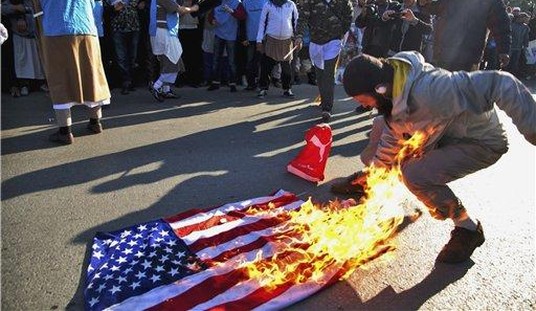Old-fashioned state sponsored propaganda is alive and well in today’s cacophony of information sources, media organizations, broadcasters, news portals, and social networks. Major empires and minor states have been engaged in the art of propaganda dating back to antiquity, all to glorify their rulers and their power, and to intimidate their foes. And if the 20th century propagandist art still offends some tastes, earlier examples from Mesopotamia, Egypt, Greece, and Rome now awe visitors in the world’s museums.
Similarly, during the Cold War, the battle of the state “information” machines of the United States and the USSR was an integral part of the greater confrontation. To what degree America’s success in the Cold War can be attributed to this information pressure rather than to other factors is open to debate, though the Voice of America and the Radio Free Europe/Radio Liberty (RFERL) certainly do claim, justifiably, some credit for influencing the course of history.
In the two decades since the fall of USSR, though, the confusion and the lack of strategy, particularly in the case of the Radio Free Europe/Radio Liberty, have made it more of an embarrassment than an heir to its Cold War self. Funded by the U.S. Congress with increasingly scarce taxpayer money, RFERL continues to employ numerous staff in order to broadcast in the languages of Eurasia and to produce analytical reports about the region. If this is done to advance U.S. strategic interests in the area, in many cases, it is less than obvious from the content of the analysis and broadcasting. On the contrary, without a clear strategic vision, the analysis RFERL produces often reflects personal biases of the authors more than anything else. One clear example is RFERL’s coverage of Azerbaijan.
Even a brief look at the pieces related to Azerbaijan on RFERL’s website reveals a deeply pessimistic and negative view of this Caucasus nation and long-time U.S. partner and ally in the region. From perceived economic woes to an overtly unflattering photo of Azerbaijan’s foreign minister in a piece that blames the Azerbaijani side for the failure of the Russian-sponsored round of negotiations with Armenia, Azerbaijan seems to be perpetually on the wrong side of every issue RFERL covers.
In the case of Armenia, the coverage is much more even-handed and even included, most recently, extensive coverage of the Armenian prime minister’s somewhat counter-intuitive vision for an “economic boom” in the Azerbaijani territories his country has been occupying for over two decades. The anti-Azerbaijani bias of RFERL has long been a subject of criticism and talk in political, media, and academic circles. Several years ago, RFERL went so far as to post a version of the Ten Commandments for Turkey, i.e., a ten-point memo from an arguably messianic Armenian politician, Raffi Hovannisian, who basically demanded that Ankara repent and initiate the nation’s self-disintegration.
Of course, a media institution’s op-ed writers are entitled to biases and opinions. This is what freedom of expression is all about. However, there is a question about how much such biases behoove an entity funded by the U.S. federal budget. Moscow’s propaganda has since adapted and now takes the smooth shape of the fancy Russia Today news channel in English. Perpetually concerned about America’s irreparable deficiencies and impending collapse, Russia Today injects a strong note of pessimism about America and all its allies in its coverage, while also voicing serious concerns over traffic violations in Russia, which reflect growing numbers of drivers as a result of economic growth. Russia Today also spends much time lamenting extremism and aggression by the Republic of Georgia, Moscow’s neighbor and regional nemesis.
While a little clumsy as far as propaganda goes, there is a clear line by Moscow to provide negative coverage of the U.S., which it sees as a competitor, and to put pressure on Georgia, with which Russia fought an actual war in 2008 and whose territories it declared “free and independent.” Similarly, Al Jazeera, the TV mouthpiece of the Qatari monarchy and, perhaps, the most professional and influential propaganda tool in recent years, is bent on advancing the interests of the ruling family in Doha. What is much less clear, however, is what interests are being advanced by RFERL’s constant attacks against Azerbaijan, Georgia, and other U.S. partners in the region.
In fact, through its coverage, RFERL has become a part of the domestic political debate in Azerbaijan staunchly supporting fringe opposition groups and criticizing the government. Often such criticism is much needed. There is no question about this and about the need for the opposition to have greater access to electronic media in Azerbaijan. Moreover, Azerbaijan clearly lacks sufficiently vibrant and diverse political discussions. All of this is true. Still, taking a side in a confrontational political debate in a country advocating for specific political forces seems to be a little inappropriate for a U.S.-budget sponsored media outlet.
The heated exchanges between Fox News and MSNBC can be considered by some as good for American politics, but, surely, few would advocate for such an exchange had one of the parties been specifically created and sponsored by, let’s say, the Chinese government. Nor does RFERL provide its readers with the whole picture. Listening to the broadcaster, one could conclude that Azerbaijan’s debt of 9% of GDP is the end of its economy, while never even hearing about the debt overtaking the GDP in the U.S. or the intricacies of the debt ceiling debate in the U.S. And when one hears about the demolishing of Baku’s older housing to make way for new construction, there is never a mention of the American concept of “eminent domain”; or when speaking about illegal detentions, one never mentions Guantanamo. Not that one would justify the other, but, given the source of funding, a disclaimer like this would probably be appropriate.
Such selective delivery of information is eerily similar to that of Russia Today and Al Jazeera, and, in the case of Azerbaijan, of the Iranian broadcasters bent on undermining the secular system in the country. However, if Russian propaganda seems to have graduated to the next level, America’s RFERL still stands as a dinosaur of the Cold War with a lofty name of “Liberty,” a counter-balance to once-mighty Communist “Pravda” (the Truth).
The concept of the government-funded RFERL promoting independent media not beholden to governments in respective countries would sound attractive for an American observer had it been applied inside the United States and is a paradox that deserves a study on its own. As for the nostalgic analysts at the RFERL lost in the paradigms of the Cold War with their personal biases blooming in the relative obscurity of the RFERL HQ in Prague, Czech Republic, one can understand the frustration of authors on the government payroll, whose negative coverage of the area is one way to stress the need for their continued employment.









Join the conversation as a VIP Member